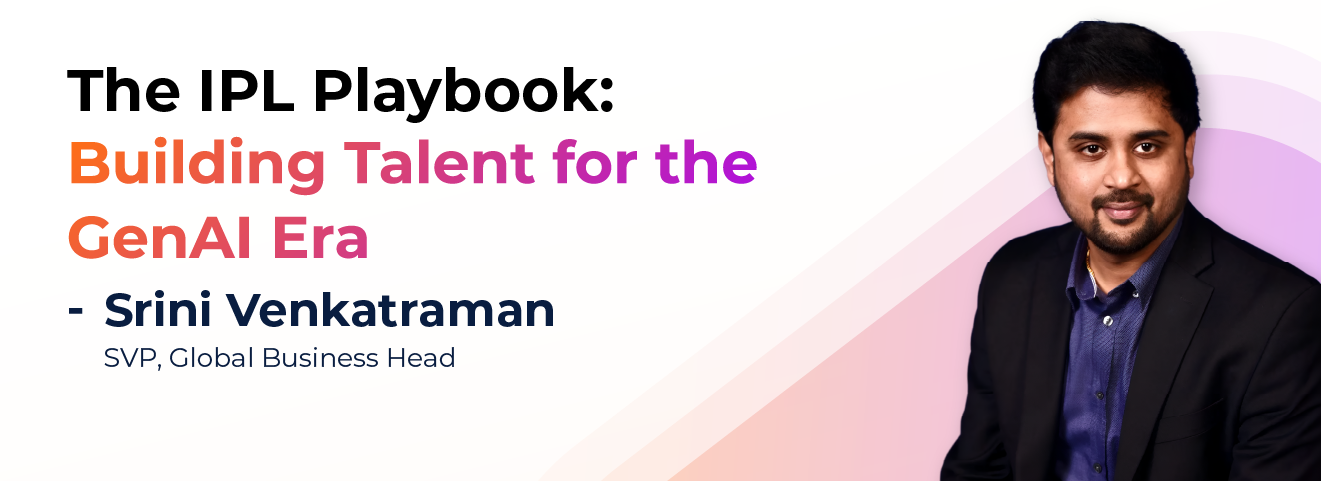My journey: Growing Through Opportunity
When I joined Cognizant in 2004 as a graduate hire, I didn’t anticipate spending over 20+ years working in various roles and geographies. My career wasn't formed overnight; it was molded by a culture that valued Organic Talent Development.
I was given opportunities to rotate into new roles, learn from mentors, and continuously upskill as the industry evolved. This trust and investment in me became the foundation of my growth. Looking back, it wasn’t just my individual journey — it was proof that when organizations develop talent from within, they unlock both personal and enterprise potential success.
The Persistent Talent Challenge
Ironically, even as I grew, I faced the flip side: how do you build strong teams at scale? The toughest question in every project and sales pursuit was the same: “Do we have the right skilled players ready to take the field? Too often, the answer is complicated". And this wasn’t just a siloed problem — it was (and remains) a systemic industry-wide challenge. The skills gap is the #1 barrier to generative artificial intelligence (GenAI) adoption.
Today, as I head Global Business at Revature, I find myself helping enterprises solve the very challenge I once faced — building strong, future-ready teams by developing talent organically instead of just buying it off the market.
Enter the GenAI Era: A New Format of the Game
Today, enterprises are entering a new phase — the GenAI era. Just as T20 revolutionized cricket, GenAI is changing the way we work, code, serve clients, and make decisions.
But here’s the catch: There’s no ready-made pool of “GenAI experts” waiting to be signed. Demand far exceeds supply. The only way to stay competitive is to do what the Indian Premier League (IPL) has done for Indian cricket: identify raw talent, train them intensively, give them match exposure, and watch them grow into world-class players.
That’s exactly where Revature comes in — helping clients recruit, train, and deploy talent pipelines that can evolve as fast as technology itself.
Build, Don’t Buy: Why Organic Talent Matters More Than Ever
1. Bench Strength Wins Championships
Teams that rely only on marquee signings (Lateral Hires) might win a few games, but sustained success comes from a deep bench of nurtured talent. Enterprises are no different.
2. Culture and Loyalty
Fans cheer louder for a homegrown star than for a temporary import. Employees also show greater loyalty and commitment when they’ve grown with you.
3. Faster Ramp-Up, Just Like IPL Debuts
A player who comes through the IPL system often performs on the international stage from Day One. Similarly, homegrown employees trained on their exact stacks and business context hit the ground running faster than external hires.
4. Cost and Sustainability
Just as the IPL model balances investment in young players with marquee signings, enterprises can’t afford to “buy” every skill. Building talent organically is a more cost-effective and sustainable approach.
What Leaders Must Do
· Shift Mindset: Stop seeing talent development as a cost center; view it as a growth engine.
· Build Talent Academies: Build structured academies and pipelines for new graduates and lateral hires to reskill into GenAI, cloud, and data roles.
· Blend Internal & External Models: Yes, bring in a few experienced “overseas players” (Lateral Hires) — but ensure most of your strength comes from the pipeline you’ve built through talent development partnerships.
· Reward Learning: Link upskilling directly to career mobility.
A Personal Reflection
If Cognizant hadn’t invested in me back in 2004, I wouldn’t have had the chance to grow into where I am today. That same principle applies now — only the stakes are higher.
In cricket, the IPL has transformed most of the country’s talent pipeline, giving us world-class performers who dominate the global stage. In business, enterprises that create their own “talent IPL” will thrive in the GenAI era. At Revature, this is exactly the playbook we’re helping clients run every day.
Technologies may change, but one truth remains: You don’t win championships by just buying players — you win by building teams.
.webp)
.webp)
The Cohort-Based Learning Environment
Explore the full story
The Cohort-Based Learning Environment
Explore the full story







.webp)
.webp)
.webp)